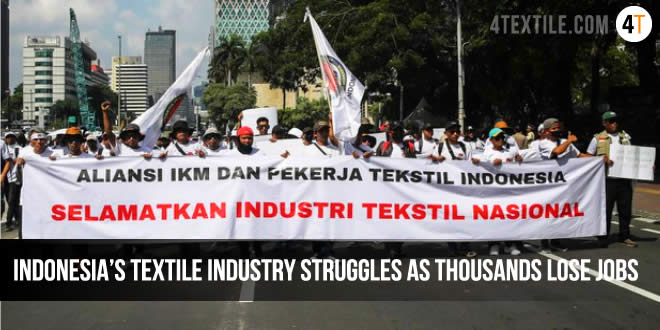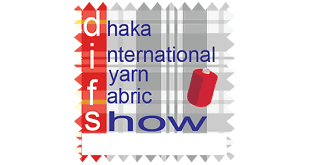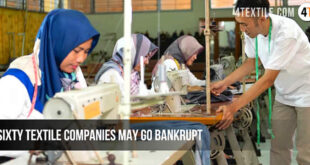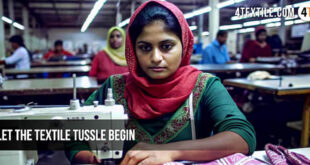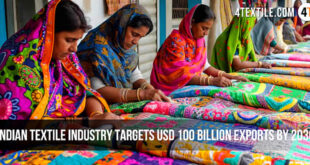Factory closures and mass layoffs signal troubled times for Indonesia’s once-booming textile sector.
Muhammad Arif Rofiudin spent 27 years meticulously maintaining machines that wove traditional sarongs at a garment factory in Pekalongan, a Central Java city that is one of Indonesia’s textile hubs.
Earlier this year, he and 1,700 colleagues lost their jobs when their company, PT Pismatex, went bankrupt – a casualty of troubled times in the country’s once-thriving textile industry.
“We’re just waiting for the company’s assets to be auctioned off so we can get our severance pay,” Rofiudin told BenarNews in late June. “Despite three attempts, there hasn’t been a single buyer.”
Yet Rofiudin finds himself among the fortunate few. His expertise in machine maintenance for nearly three decades secured him a position in a new firm.
Indonesia’s textile industry, a longtime pillar of the national economy, is mired in an existential crisis as the sector faces a wave of layoffs, factory closures, and dwindling exports, amid strong competition from China.
From January to June 2024 alone, 10 companies shed nearly 14,000 jobs, including industry giant Sritex, which laid off a third of its workforce, labor unions said.
The global economic slowdown has dampened demand for clothing and other textile products, while a flood of cheap imports, particularly coming from China, has undercut Indonesian manufacturers, industry experts said.
Ristadi, the president of the Nusantara Workers’ Union Confederation (KSPN), said the decline of the textile industry in Southeast Asia’s largest economy was apparent as early as 2010.
Since 2019, 36 medium to large-scale textile companies have shut down, while 31 others have downsized operations, a trend exacerbated by free-trade area policies and bilateral agreements with other textile-producing nations, Ristadi said.
“We’ve fallen behind. When you lag in technology, you lose out in productivity and quality, which then impacts production costs,” Ristadi, who goes by one name, told BenarNews. “Imported products end up being cheaper.”
Warnings by the union to the government have been ignored, he said, leading to an increase of rampant imports each year.
Data from Statistics Indonesia, a public body, showed the value of textile exports in 2023 hit a record low of U.S. $3.63 billion, below the $3.58 billion recorded in 2020 at the onset of the COVID-19 pandemic.
Export volumes also fell to 1.49 million tons in 2023, down from 1.7 million tons the previous year.
The value of clothing imports from China, which peaked at $586.27 million in 2020, has been steadily declining due to the combined effects of COVID-19 and trade regulations.
However, China remains a significant player in Indonesia’s textile market, with imports reaching $91.83 million as of April this year.
The situation is particularly dire in Pekalongan, a historic center of textile production known for its intricate batik fabrics.
The city’s once-bustling factories are now running at reduced capacity or shuttered altogether, leaving thousands of workers scrambling to make ends meet.
Jemmy Kartiwa Sastraatmadja, chairman of the Indonesian Textile Association (API), said global economic slowdown was a major factor.
“Global purchasing power remains weak, leading many countries to implement trade protection policies,” Jemmy told BenarNews. “This has caused major textile producers like China to lose export markets, resulting in overstocked inventory.”
This inventory is then exported to countries with weak trade policies, such as Indonesia, Jemmy said.
The massive influx of cheap Chinese imports has affected Indonesian manufacturers, resulting in reduced orders and ultimately factory closures.
“Imports from China have a significant impact, as China has consistently ranked first in the list of textile-exporting countries [to Indonesia] in previous years,” Jemmy said.
Increase in import tariffs
The Indonesian government has responded to the crisis with protectionist measures, including tariffs on imports and increased scrutiny of illegal imports.
Last week, Trade Minister Zulkifli Hasan announced plans to impose tariffs that could go as high as 200% on a variety of Chinese imports.
Agung Krisdiyanto, a senior advisor to the Presidential Staff Office, said the move targets items such as clothing, steel, and textiles, which the government believes are being sold below their production costs, thereby undermining the ability of domestic producers to compete.
The Indonesian government blamed the influx of Chinese products on the trade war between China and the United States, which has resulted in a surplus of goods.
Agung said the tariffs, which include anti-dumping and safeguard duties, will initially apply to as many as 12 product categories, with more expected to be added in the future.
“If [domestic producers] are hit by products below the cost of goods sold, they will definitely collapse,” Agung told BenarNews. “For this reason, the government is stepping in to protect our domestic industry.”
Agung said the government also planned to crack down on illegal imports of cheap goods and deploy more personnel to enforce the new tariffs.
While concerns have been raised about the potential impact of the tariffs on foreign investment, Agung said the priority was to protect domestic industries.
Industry experts say the government needs to do more to support the industry, such as investing in technology and training to boost productivity.
Bhima Yudhistira, executive director of the Center of Economic and Law Studies (CELIOS), a think-tank, said that while external factors played a role in the industry’s challenges, internal problems were also to blame.
“We can see this with the relocation of many global garment brand factories to Vietnam, Bangladesh, and even Ethiopia,” he told BenarNews. “They find doing business in Indonesia relatively expensive. Infrastructure and logistics costs in Indonesia are still problematic.”
Bhima also pointed to inconsistent government support for the manufacturing sector, high interest rates, low purchasing power among consumers, and a weakening rupiah, which makes imported raw materials more expensive.
He warned that without significant policy changes, the wave of mass layoffs would likely continue.
Payaman Simanjuntak, a labor economist and observer from the University of Indonesia, urged the government to impose stricter import restrictions and encourage textile companies to increase productivity, particularly in the digital age.
“Indonesia must adapt. The key is to create new jobs for those replaced by machines and to rely on domestic production,” Payaman told BenarNews.
For workers caught in the crossfire of these global and domestic forces, such as Rofiudin, the future remains uncertain.
“Anxiety lingers. The influx of Chinese imports is relentless. If textile giants are struggling to stand firm, what chance do the smaller companies have?”
 4Textile.com World Textile & Apparel Industry Events, News
4Textile.com World Textile & Apparel Industry Events, News
